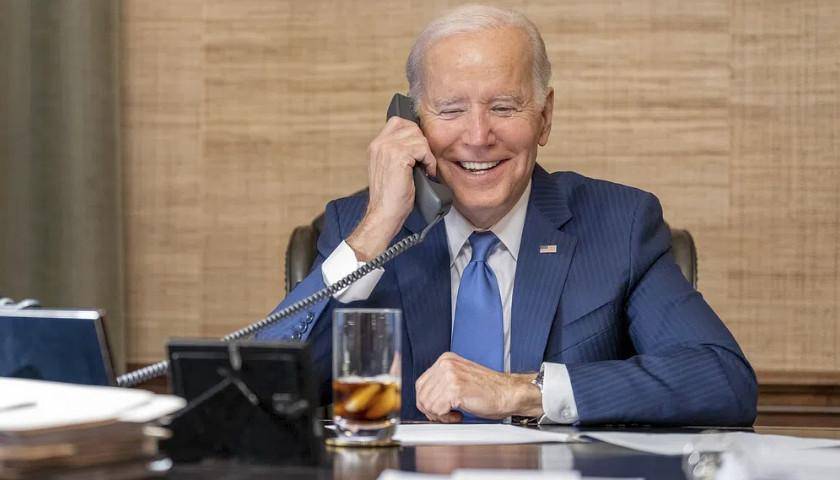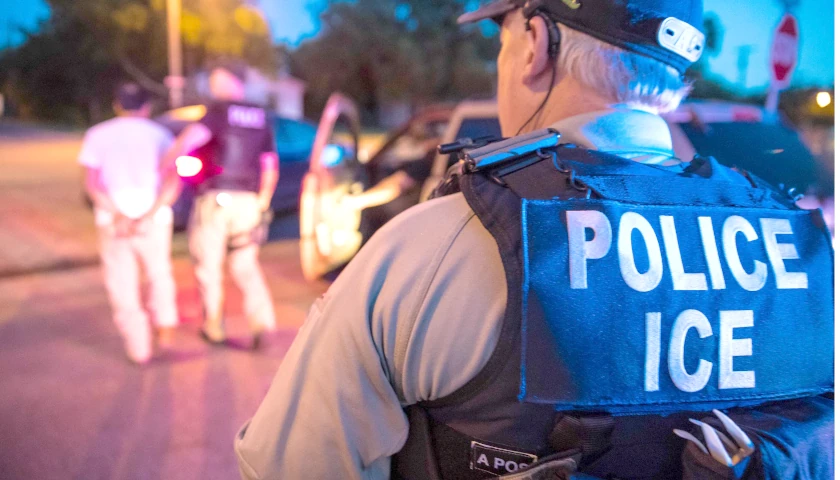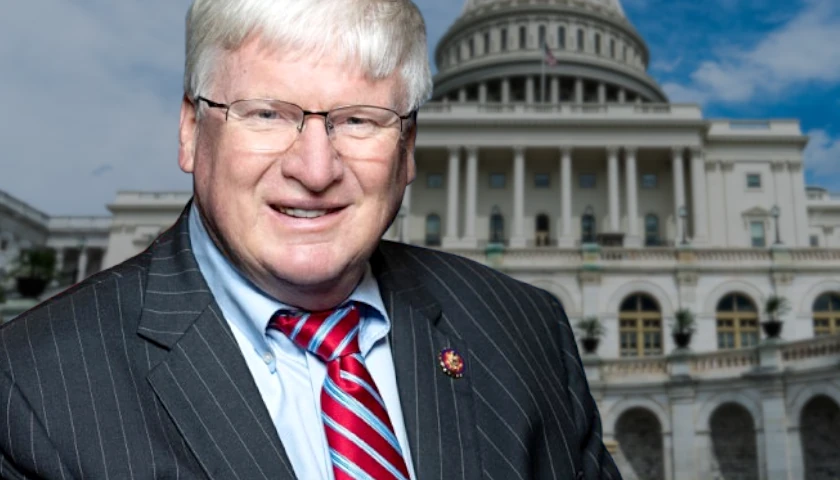by John Solomon and Steven Richards
As early as 2010, Joe Biden routinely used a private email account with a fake name to conduct official government business as vice president, and at times copied his sons and brother on exchanges that included some of the highest ranking officials inside the White House, according to documents released under a historic lawsuit against the National Archives.
The National Archives and Records Administration released this month to the Southeastern Legal Foundation, a public interest law firm, only about 60 emails of the 82,000 pages of emails it says it preserved from Joe Biden’s private, pseudonym email accounts from his time as vice president.
The records were produced pursuant to a Freedom of Information Act lawsuit prompted by Just the News reporting three years ago that revealed Biden used at least three different pseudonym private email accounts when he was Barack Obama’s vice president.
All the emails in the initial release involved a Google email account that Joe Biden used called [email protected] and were sent during the calendar year 2010, the second full year of the Obama presidency.
The emails that were disclosed pursuant to the FOIA lawsuit show that Biden conducted official White House business on his private, commercial email account, including receiving copies of speeches he made, drafts of speeches he was going to give and news articles he wanted to discuss with his senior staff.
In one such email, he transmitted an unflattering news article about his boss, Barack Obama, to then security adviser and current Secretary of State Antony Blinken. The article in Politico was titled “The ego factor: Can Barack Obama change?” and it was sent to Blinken’s official White House email account.
On some occasions, Joe Biden would send information to the government emails of his White House staff from his private email account and include his sons Hunter and Beau and his brother James Biden, the newly released emails show.
For instance, on Oct. 19, 2010, the then-vice president sent an article from The New York Times about planned House GOP budget cuts to a half dozen of his top staff, including then-Chief of Staff Ron Klain and spokesman Jay Carney. He included both of his sons, Hunter Biden and the late Beau Biden, as well as his younger brother James. Neither his sons or his brother had any official capacity to act or advise upon those proposed budget cuts.
The significant portion of the emails released in the document production were redacted by the Archives, which cited personal information and Presidential Records Act exemptions. The Archives says that it plans to keep private communications from public release, including those Joe Biden had with his son and brother.
“22 email messages in whole and 4 email messages in part have been exempted from release in compliance with the restrictions of the PRA and applicable FOIA exemptions, which specify what material may be released to the public. All necessary steps were taken to segregate and release non-exempt information,” NARA’s letter to the Southeastern Legal Foundation reads.
The first batch released drew immediate condemnation from congressional investigators who have long pursued the family’s overseas business dealings ranging from Ukraine to China and have often been stymied in efforts to get evidence from federal agencies.They said too many officials in prior Democratic administrations routinely used private email for government business despite requirements not to do so.
“[The] Obama administration and now the Biden administration, they were both lawless administrations, it is obvious that number of administration officials during the Obama years, completely violated the Federal Records Act with impunity, they couldn’t care less,” Sen. Ron Johnson, R-Wis., told the “Just the News, No Noise” TV show in an interview set to air Friday.
“And we have emails from private email accounts going right to President Obama, right. So they knew they were violating this, but they just did it with impunity,” Johnson added. Johnson also drew parallels between Biden’s use of a private email to former Secretary of State Hillary Clinton’s use of a private email server for which she was investigated but never charged.
“It’ll be really interesting to see how many emails Vice President Biden sent once the Hillary Clinton email scandal broke, where it was obvious that this was made public and this is a real problem for this the secretary of state at that point in time,” Johnson said. He added: “They do this with impunity, because by and large, the media does not hold them accountable. So they they know they can get away with it.”
Nearly all federal agencies prohibit government employees from using private emails to ensure compliance with the Federal Records Act, the law that requires federal records to be preserved and available for public inspection. If officials do use private email for tier work, they are obligated to forward the information to their work accounts to ensure their preservation.
A scathing 2019 State Department review of Hillary Clinton’s misuse of personal email during her time as Secretary of State also provided another reason why private email shouldn’t be used. “The use of a private email system to conduct official business added an increased degree of risk of compromise as a private system lacks the network monitoring and intrusion detection capabilities of State Department networks,” the final report noted.
Kimberly Hermann, executive director of the Southeastern Legal Foundation which worked with Just the News to force the disclosure of the records, said she believes the Archives are moving too slowly to produce them, noting the first production was just a sliver of the total pages.
“The emails NARA produced to SLF this week confirm that Joe Biden used at least one pseudonym Gmail account to conduct government business during his time as Vice President. The public importance of these emails is undisputed,” Hermann said.
“Unfortunately, NARA has only processed about 1% of the potentially responsive emails. SLF is diligently advocating for a faster processing rate, an issue which is currently before the court,” she added.
In addition to keeping family emails from being released, the Archives also redacted some communications between Biden and his senior staff, including an email titled “2011 strategic planning” that was sent from Biden’s chief of staff to over two dozen of the vice president’s staff and that copied his private email, [email protected].
This communication was redacted under the “P5” exemption, which excludes information from FOIA requests that “would disclose confidential advice between the President and his advisors, or between such advisors,” under the Presidential Records Act.
At least seven of the newly released emails include Biden family members as recipients, though the content is redacted. Hunter and the late Beau Biden, who died of cancer in 2015, are frequently copied or are listed as recipients in these communications.
It also appears from this small sliver of emails that Joe Biden often communicated with Hunter Biden at his Rosemont Seneca work email. Shortly after this period in 2010, Hunter Biden and his Rosemont Seneca firm would begin exploring deals abroad, most notably in China.
Hunter and his Rosemont associate Eric Schwerin also used their work emails to discuss Joe Biden’s finances in 2010, including his mortgage and “future earnings potential,” Just the News reported last year, citing emails obtained separately from Hunter Biden’s abandoned laptop.
Senior staff also sent Biden copies of prepared remarks and transcripts of past speeches at his private email address on a range of topics, including economic policy, holiday receptions and national security.
In one email, sent on Nov. 9, 2010, Biden’s personal aide Francis Person sent two documents to the private email with remarks for a “Retrofit Event” and a “Diwali Reception.”
In another email sent on Nov. 9, Person sent nine transcripts of foreign policy speeches that Biden had delivered earlier that year.
“I think we can all agree that, no matter what position you hold in government, it is breathtakingly wrong to use a private gmail account to correspond with the official email accounts of high level government executives about sensitive government business while also sharing government documents,” Kevin Brock, a former FBI intelligence chief, told Just the News on Thursday.
“Not only does it violate federal records laws it also swings the door wide open for surveillance by hostile intelligence services. Gmail is not a secure government communications system. And especially not for White House business,” Brock added.
“If RobinWare456 generated emails that now must be redacted due to their sensitive content, even if unclassified, then you can be assured that they attracted the deep interest of intelligence agencies of the PRC and Russia at that time and that their spies were quick to figure out the true identity of RobinWare456,” Brock continued. “It makes you wonder why our government even bothers to create sophisticated secure comms when officials at the highest level do stupid stuff like this.”
This small batch of emails—less than 0.08% of the total number originally identified by the Archives—were provided after pressure from the Southeastern Legal Foundation for the National Archives to speed up its production of documents pursuant to the FOIA request.
So far, NARA has delayed nineteen months in producing the the approximately 18,000 pages of records responsive to the request for communications by then-Vice President Biden in which he used a pseudonym email, after the scope of the request was narrowed from 82,000 in litigation to speed up the process.
After 19 months of delay, NARA further requested additional time to produce the documents responsive to the narrowed request.
“NARA now demands at least an additional 2.5 years to process the responsive documents—resulting in a total of more than four years from the date of the Request (Doc. 12 at 20)—despite SLF having agreed to substantially limit its request through narrowing search terms,” SLF wrote in a brief filed in early January.
SFL argued that this further delay would “render FOIA’s guarantee of prompt availability a dead letter” and harm the ability to inform the American public.
Separately, in August, House Republicans leading the impeachment inquiry demanded that NARA grant them access to the full catalogue of Joe Biden’s private email communications while he was vice president.
Yet, the congressional probe has faced resistance from the Archives. By October, NARA had only turned over 14 pages of the 82,000 preserved in its records, which frustrated Oversight Committee Chairman James Comer, who vowed to use the “power of the gavel” to obtain the records.
– – –
John Solomon is an award-winning investigative journalist, author and digital media entrepreneur who serves as Chief Executive Officer and Editor in Chief of Just the News. Steven Richards joined Just the News in August 2023 after previously working as a Research Analyst for the Government Accountability Institute (GAI) in Tallahassee, Florida. He is a two-time graduate of Florida State University with a Masters in Political Science and a B.S. in International Affairs.





